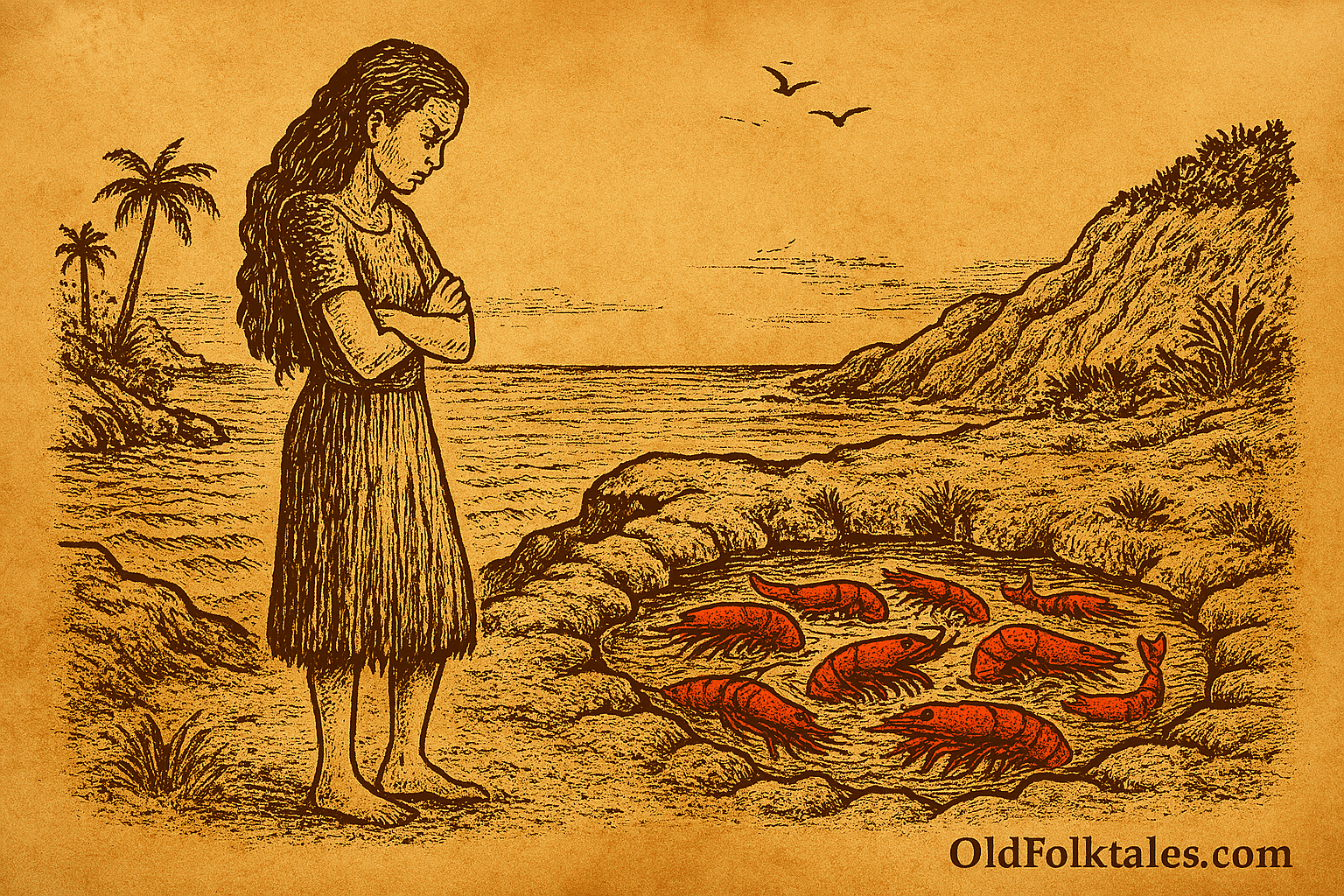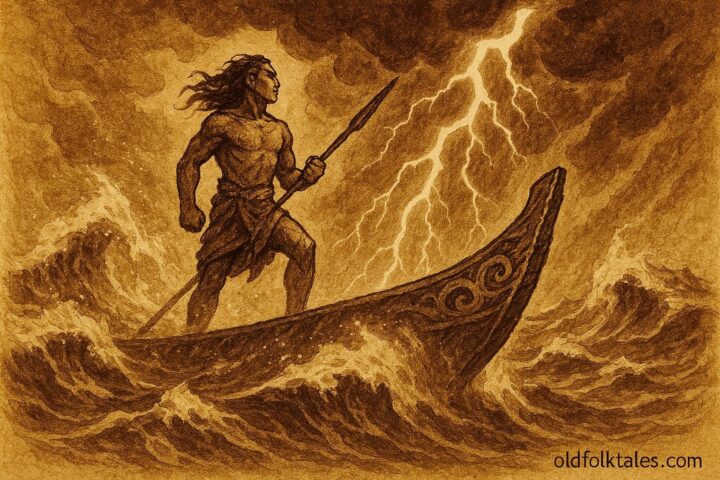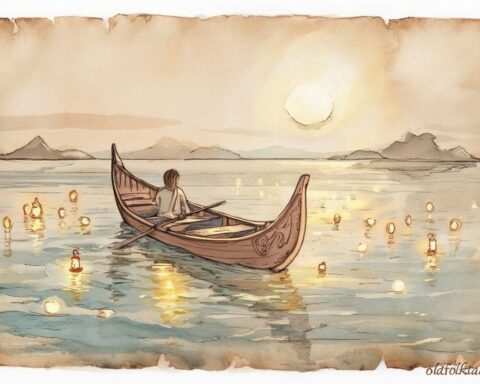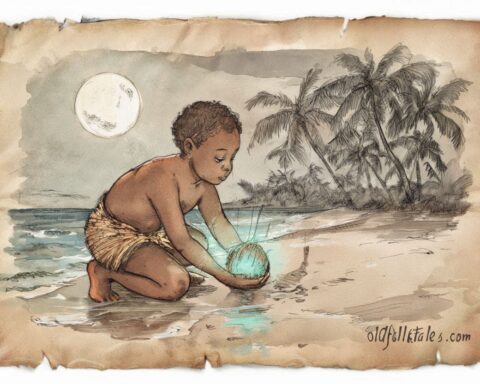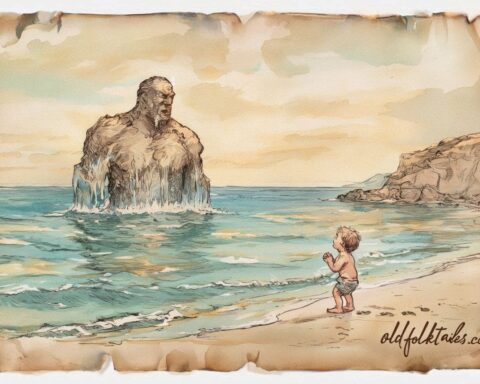The island of Vatulele rises from the turquoise waters of Fiji like a crown of coral and stone, its shores carved by centuries of waves into shallow pools and rocky ledges. Here, beneath the equatorial sun, the tide brings gifts twice daily shells, seaweed, small fish darting through crystal shallows. But in certain pools, visitors will find creatures found nowhere else: prawns the color of fresh blood, crimson as sunset, moving through the water like living jewels.
The elders say these are no ordinary prawns. They are a memory made flesh, a warning written in scarlet the final chapter of a story about beauty, pride, and the terrible price of forgetting one’s place in the web of community.
Click to read all Melanesian Folktales — rich oral storytelling from Papua New Guinea, Fiji, Solomon Islands, and Vanuatu
Long ago, when the ancestors tended their taro patches and the village fires burned bright against the Pacific darkness, there lived a maiden whose beauty was spoken of from shore to shore. Her name was Lewa-ni-Cagi-Bula the Maiden of the Fair Wind and she moved through the village like breeze itself, graceful and untouchable. Her hair fell like black water down her back. Her eyes held the depth of ocean trenches. When she walked, men stopped their work to watch, and when she spoke, her voice was music.
But Lewa-ni-Cagi-Bula’s beauty had grown into something harder than coral, sharper than volcanic glass. Pride had taken root in her heart like strangler vines around a tree, choking out humility and kindness. Suitor after suitor came to her family’s home bearing gifts woven mats, polished shells, carved bowls of precious wood. Each time, she turned them away with barely concealed contempt. What were they compared to her? What could any of them offer that matched her magnificence?
Word of the beautiful, unapproachable maiden reached the ears of a chief’s son from a neighboring village. He was young and strong, his future assured by birth and promise. But when he heard of Lewa-ni-Cagi-Bula, something stirred in him that had nothing to do with politics or alliance. He resolved to win her heart, certain that the right gift, the perfect offering, would melt her icy pride.
He prepared for days, gathering treasures his family had accumulated through generations. Fine tapa cloth beaten to softness. Whale teeth strung on braided cord, each one a symbol of prestige and power. And as his final, most spectacular gift, he acquired something truly rare extraordinarily large red prawns, creatures of such size and brilliant color that they seemed to have been painted by the gods themselves.
On the day appointed for his visit, the chief’s son made the journey to Vatulele. He climbed the rocky paths with his basket of gifts balanced carefully, his heart beating with hope and anticipation. The red prawns gleamed in the sunlight, their shells catching the light like rubies.
When he reached the place where Lewa-ni-Cagi-Bula waited, he laid his offerings before her with all the eloquence he possessed. He spoke of his admiration, of the honor his family offered, of the future they might build together. The red prawns lay between them, magnificent and impossible.
Lewa-ni-Cagi-Bula looked at the gifts. She looked at the young man, travel-worn and earnest. And she felt nothing but scorn.
“You think these trinkets can buy me?” Her voice was cold as deep water. “You think I would bind myself to you for prawns and cloth?”
The young chief’s son felt shame wash over him like a wave. He had offered everything he valued, everything his culture held precious, and it had been dismissed as worthless. In some versions of the tale, he tried to speak again, to explain. In others, he simply stood frozen, humiliated before the woman he had hoped to honor.
What happened next depends on who tells the story. Some say that in her anger and contempt, Lewa-ni-Cagi-Bula pushed the young man, and he stumbled backward toward the cliff’s edge. Others say he retreated on his own, backing away from her fury, his basket falling from his hands. But all agree on what followed.
The chief’s son fell or perhaps jumped into the sea below. The rocky cliff face tore at him as he went down, leaving scars on the stone that can still be seen today. The basket tumbled after him, and the magnificent red prawns scattered, falling into a shallow rocky pool.
But the prawns did not simply land and swim away. Whether by the tears of the ancestors, the curse of the wronged suitor, or the judgment of the gods themselves, transformation came. In some tellings, the prawns were changed in that moment, becoming something new not just creatures, but a living monument to rejection and pride. In other versions, something even stranger occurred: Lewa-ni-Cagi-Bula herself was transformed, her beauty and cold pride remade into the form of crimson prawns, trapped forever in that shallow pool, unable to leave, unable to be anything but what her cruelty had made her.
The tide pools of Vatulele still hold these red prawns today. Locals will show visitors the exact spot, pointing to the scarred rocks where the chief’s son made his desperate crossing from land to sea. The prawns remain, generation after generation, their brilliant color a warning written in the language of nature itself.
In the villages, mothers tell their daughters this story when they see pride growing like a weed in young hearts. They speak of Lewa-ni-Cagi-Bula and remind them that beauty without kindness is a curse, not a blessing. That to reject proper community obligations to honor guests, to consider alliances, to value what others offer is to reject one’s own humanity.
The Maiden of the Fair Wind became the prawns of the shallow pools, and her story became the island’s memory, permanent as stone and as red as blood.
Explore tales of ancestral spirits and island creation that connect people to the land and sea
The Moral Lesson
This legend serves as a powerful warning against excessive pride and the rejection of community values. Lewa-ni-Cagi-Bula’s beauty gave her status, but her refusal to honor those who approached her properly bringing gifts according to custom violated the sacred obligations that bind communities together. In Fijian culture, where reciprocity and respect form the foundation of social harmony, her cold rejection of the chief’s son was not merely personal preference but a breaking of fundamental social bonds. The transformation into prawns (or the prawns themselves) stands as an eternal reminder that those who place themselves above community obligations risk losing their humanity entirely.
Knowledge Check
Q1: Who was Lewa-ni-Cagi-Bula in the Vatulele legend? A: Lewa-ni-Cagi-Bula, meaning “Maiden of the Fair Wind,” was a beautiful island maiden on Vatulele whose extraordinary beauty was matched only by her pride and cold rejection of all suitors who sought her hand.
Q2: What gift did the chief’s son bring to win the maiden’s heart? A: The chief’s son brought traditional valuable gifts including tapa cloth and whale teeth, but his most spectacular offering was extraordinarily large red prawns of brilliant color, creatures of exceptional rarity and beauty.
Q3: What happened when Lewa-ni-Cagi-Bula rejected the chief’s son? A: In her anger and contempt, she either pushed him or caused him to fall from a cliff into the sea below. His basket of red prawns fell into a shallow rocky pool, where they were miraculously transformed, or in some versions, the maiden herself was transformed into the prawns.
Q4: What natural phenomenon does this legend explain? A: The legend explains the presence of distinctive crimson-colored prawns found only in certain shallow rocky pools around Vatulele Island, creatures whose brilliant red color is unlike prawns found elsewhere in Fiji.
Q5: What do the scarred rocks of Vatulele represent in the story? A: The scarred rocks along the cliff face are said to be the marks left by the chief’s son’s body as he fell or jumped into the sea, serving as a permanent physical reminder of the tragic encounter and failed courtship.
Q6: What cultural lesson does this Fijian tale teach about community obligations? A: The story warns against excessive pride and emphasizes the importance of honoring proper social customs, including the respectful treatment of suitors who approach with traditional gifts. It teaches that rejecting community obligations and placing oneself above others leads to isolation and loss of humanity.
Source: Adapted from traditional Fijian oral folktales of Vatulele Island, as documented in Pacific Island folklore collections and local cultural narratives.
Cultural Origin: Vatulele Island, Fiji
